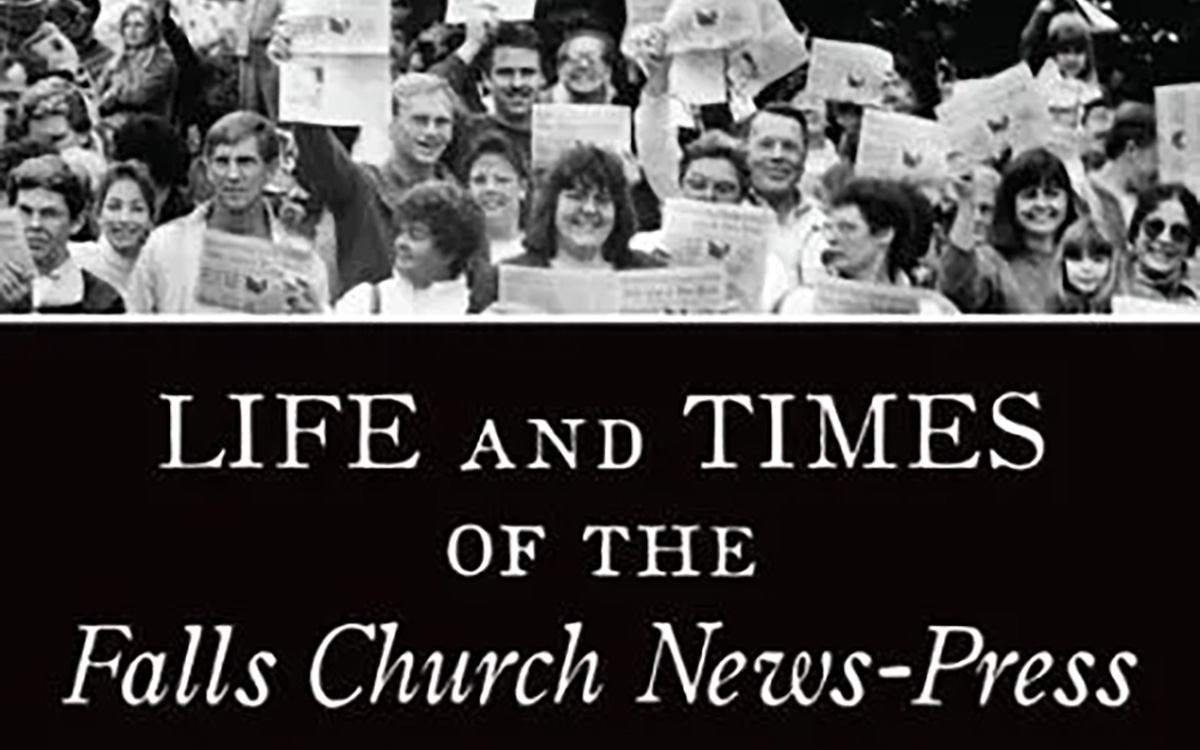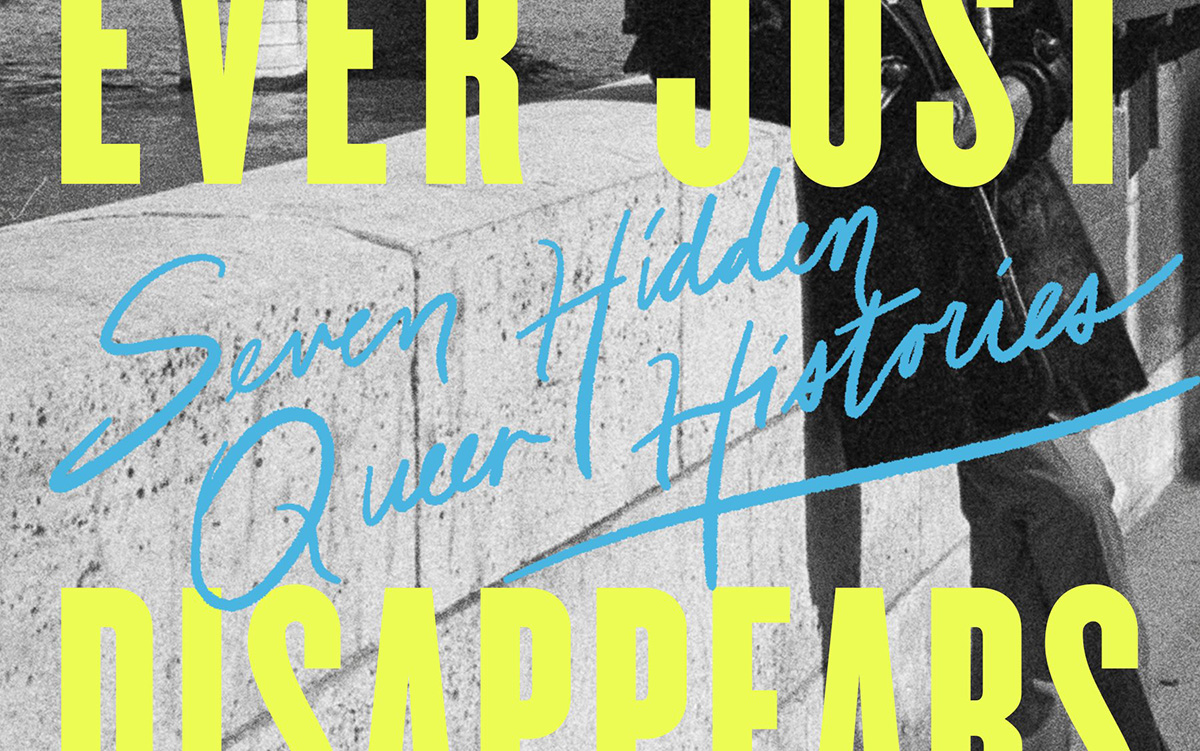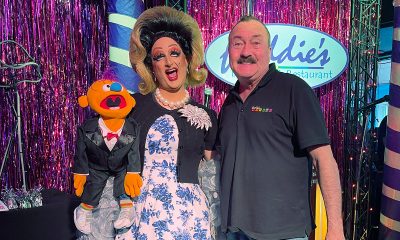Books
New book chronicles founding of gay-owned Falls Church News-Press
Nick Benton emerged as major influencer and nurturer of local talent

The History Press released a book by D.C.-area journalist Charlie Clark in October entitled, “The Life and Times of the Falls Church News-Press” (a 192 page paperback).
The News-Press was founded in 1991 by journalist and gay activist Nicholas Benton and has published more than 1,700 consecutive weekly editions since serving the inside-the-beltway Northern Virginia suburb of the City of Falls Church, a mere seven miles from the White House.
In its masthead, the News-Press says of itself, “Since 1991, an award-winning LGBT-owned general interest community newspaper.” It has been named the Business of the Year twice and Benton the Person of the Year by the Falls Church City Council. These are selected excerpts from the Clark book:
“Its founder, Nicholas F. Benton, is a native Californian, college baseball player, degreed master of divinity, gay activist and journalist born “with printer’s ink in his veins” – or so he suspects. He launched the Falls Church News-Press largely as a one-man band. But with unflagging energy, he emerged as a major influencer and talent nurturer.
“Benton knows the key players, hosts frequent parties and can be see walking the streets and dining at eateries that make Falls Church homey. In editorials written every week by Benton himself, the editor strives to protect the city’s prize schools by pressing for property tax revenues and favoring development in the occasional battles with traditionalists who treasure the residential village. He made his mark on zoning disputes over how to tastefully attract commercial development. News-Press news sections combine small-town intimate coverage – plenty of photographs of smiling residents lined up for the camera – with exclusive accounts of action by the city council and the school board (at whose meetings Benton is sometimes the only member in attendance)….
“Some say it’s a miracle that Benton’s close-to-home news organ – backed neither by inherited wealth nor corporate investors – has survived three decades, given the current death knells for local news outlets…. The book you hold relays the tale of how Benton pulled things off. He takes virtually no vacations (beyond a few weekends). He pays staff writers (and offers health insurance) rather than engaging too many volunteers. He hires and mentors high school students. He gives the paper out for free and publishes letters that criticize. He donates to charities and cultivates youth readers by boosting high school and Little League sports, holiday parades, scouting and local history. His team covers charities, efforts to aid the homeless, published authors, theater productions, demands for low-income housing, struggling small businesses, gay rights and wars over parking. And Benton invites the public to his office parties..
“The News-Press is one of the things that make Falls Church special,” Mayor Dave Tarter told me as this book was in preparation. “The paper reinforces and enhances the sense of community of shared experiences” in covering stories that the Washington Post would not make space for. “It is a labor of love for Nick Benton, and it shows. Whether you love it or hate it, everyone reads the News-Press…”
“…Benton enrolled at the Pacific School of Religion in Berkeley (class of 1969). This brought him to the University of California’s flagship school at the height of the antiwar, civil rights and student power protests, a time when the smell of the national guardsmen’s tear gas was familiar on campus. Benton was awarded his master of divinity diploma cum laude on June 13, 1969 (it is framed and displayed today in the News-Press office. He worked as a youth minister for three years at seminary but never pursued that as a career. He would later consider his newspaper ownership a close substitute to ministry…
“Benton remained in the Bay Area and worked for the famous alternative weekly, the Berkeley Barb, enjoying the freedom to publish on counterculture subjects from women’s liberation to rock music…While at the Barb Benton also came out as gay, just before the 1969 Stonewall Riot in New York’s Greenwich Village that launched the gay right movement. His articles, he later wrote, “promoted the notion that fully actualized, gay liberation had the potential to be socially transformative.” He penned the editorial for the first edition of the Gay Sunshine newspaper, and he coproduced a pair of issues of his own fledgling gay newspaper, the Effeminist…
“… By 1987, he had incorporated his own news service…It became the context for his decision in early December 1990 to launch the News-Press. He would pull it off by charming volunteer labor and combining it with his own seven-days-a-week style. Another secret to Benton’s success: he is “frugal.” There were no desks in the office, just boards and folding chairs. “Editor in Chief Nick Benton is too modest to blow his own horn,” wrote reader Robert O. Beach in a letter published in March 1998. “But he deserves tremendous credit for the vital contribution the News-Press makes to our community.”
“Environmental consultant and history activist Dave Eckert goes further. “The News-Press became the focal point of Falls Church,” he said in 2022. “Nick Benton wanted to do good journalism, get readers and advertisements, but in many ways the paper brought the city together. And in many ways it drove it apart.”
“… ‘We worked all night on that first issue,’ Benton recalled, ‘and as the deadline approached, as dawn began to break on March 27, we looked out our second-story windows to see that the cherry blossom trees on North Virginia Avenue had blossomed overnight. That was our sign to press ahead.’
“After the proverbial all-nighter, his team of three drove to Gaithersburg, Md., to the Comprint Co. plant to witness the maiden print run. ‘When the press bell rang and everything started to move, it was a very special moment,’ Benton remembered. ‘As the papers started chugging onto a conveyor belt, I couldn’t help but stand on a box and loudly exclaim, ‘Let every tyrant tremble!’ The noise of the press drowned me out so that only a couple of pressmen gave me funny looks.’
“Back in Falls Church, young O’Brien had walked the streets crowing, ‘Have you heard the news? Come March 28, Falls Church is going to have its own newspaper!’”
Books
New book offers observations on race, beauty, love
‘How to Live Free in a Dangerous World’ is a journey of discovery

‘How to Live Free in a Dangerous World: A Decolonial Memoir’
By Shayla Lawson
c.2024, Tiny Reparations Books
$29/320 pages
Do you really need three pairs of shoes?
The answer is probably yes: you can’t dance in hikers, you can’t shop in stilettos, you can’t hike in clogs. So what else do you overpack on this long-awaited trip? Extra shorts, extra tees, you can’t have enough things to wear. And in the new book “How to Live Free in a Dangerous World” by Shayla Lawson, you’ll need to bring your curiosity.

Minneapolis has always been one of their favorite cities, perhaps because Shayla Lawson was at one of Prince’s first concerts. They weren’t born yet; they were there in their mother’s womb and it was the first of many concerts.
In all their travels, Lawson has noticed that “being a Black American” has its benefits. People in other countries seem to hold Black Americans in higher esteem than do people in America. Still, there’s racism – for instance, their husband’s family celebrates Christmas in blackface.
Yes, Lawson was married to a Dutch man they met in Harlem. “Not Haarlem,” Lawson is quick to point out, and after the wedding, they became a housewife, learned the language of their husband, and fell in love with his grandmother. Alas, he cheated on them and the marriage didn’t last. He gave them a dog, which loved them more than the man ever did.
They’ve been to Spain, and saw a tagline in which a dark-skinned Earth Mother was created. Said Lawson, “I find it ironic, to be ordained a deity when it’s been a … journey to be treated like a person.”
They’ve fallen in love with “middle-American drag: it’s the glitteriest because our mothers are the prettiest.” They changed their pronouns after a struggle “to define my identity,” pointing out that in many languages, pronouns are “genderless.” They looked upon Frida Kahlo in Mexico, and thought about their own disability. And they wish you a good trip, wherever you’re going.
“No matter where you are,” says Lawson, “may you always be certain who you are. And when you are, get everything you deserve.”
Crack open the front cover of “How to Live Free in a Dangerous World” and you might wonder what the heck you just got yourself into. The first chapter is artsy, painted with watercolors, and difficult to peg. Stick around, though. It gets better.
Past that opening, author Shayna Lawson takes readers on a not-so-little trip, both world-wide and with observant eyes – although it seems, at times, that the former is secondary to that which Lawson sees. Readers won’t mind that so much; the observations on race, beauty, love, the attitudes of others toward America, and finding one’s best life are really what takes the wheel in this memoir anyhow. Reading this book, therefore, is not so much a vacation as it is a journey of discovery and joy.
Just be willing to keep reading, that’s all you need to know to get the most out of this book. Stick around and “How to Live Free in a Dangerous World” is what to pack.
The Blade may receive commissions from qualifying purchases made via this post.
Books
Story of paralysis and survival features queer characters
‘Unswerving: A Novel’ opens your eyes and makes you think

‘Unswerving: A Novel’
By Barbara Ridley
c.2024, University of Wisconsin Press
$19.95 / 227 pages
It happened in a heartbeat.
A split-second, a half a breath, that’s all it took. It was so quick, so sharp-edged that you can almost draw a line between before and after, between then and now. Will anything ever be the same again? Perhaps, but maybe not. As in the new book “Unswerving” by Barbara Ridley, things change, and so might you.

She could remember lines, hypnotizing yellow ones spaced on a road, and her partner, Les, asleep in the seat beside her. It was all so hazy. Everything Tave Greenwich could recall before she woke up in a hospital bed felt like a dream.
It was as though she’d lost a month of her life.
“Life,” if you even wanted to call it that, which she didn’t. Tave’s hands resembled claws bent at the wrist. Before the accident, she was a talented softball catcher but now she could barely get her arms to raise above her shoulders. She could hear her stomach gurgle, but she couldn’t feel it. Paralyzed from the chest down, Tave had to have help with even the most basic care.
She was told that she could learn some skills again, if she worked hard. She was told that she’d leave rehab some day soon. What nobody told her was how Les, Leslie, her partner, girlfriend, love, was doing after the accident.
Physical therapist Beth Farringdon was reminded time and again not to get over-involved with her patients, but she saw something in Tave that she couldn’t ignore. Beth was on the board of directors of a group that sponsored sporting events for disabled athletes; she knew people who could serve as role models for Tave, and she knew that all this could ease Tave’s adjustment into her new life. It was probably not entirely in her job description, but Beth couldn’t stop thinking of ways to help Tave who, at 23, was practically a baby.
She could, for instance, take Tave on outings or help find Les – even though it made Beth’s own girlfriend, Katy, jealous.
So, here’s a little something to know before you start reading “Unswerving”: author Barbara Ridley is a former nurse-practitioner who used to care for patients with spinal cord injuries. That should give readers a comfortable sense of satisfaction, knowing that her experiences give this novel an authenticity that feels right and rings true, no faking.
But that’s not the only appeal of this book: while there are a few minor things that might have readers shaking their heads (HIPAA, anyone?), Ridley’s characters are mostly lifelike and mostly likable. Even the nasties are well done and the mysterious character that’s there-not-there boosts the appeal. Put everyone together, twist a little bit to the left, give them some plotlines that can’t ruined by early guessing, and you’ve got a quick-read novel that you can enjoy and feel good about sharing.
And share you will because this is a book that may also open a few eyes and make readers think. Start “Unswerving” and you’ll (heart) it.
The Blade may receive commissions from qualifying purchases made via this post.
Books
Examining importance of queer places in history of arts and culture
‘Nothing Ever Just Disappears’ shines with grace and lyrical prose

‘Nothing Ever Just Disappears: Seven Hidden Queer Histories’
By Diarmuid Hester
c.2024, Pegasus Books
$29.95/358 pages
Go to your spot.
Where that is comes to mind immediately: a palatial home with soaring windows, or a humble cabin in a glen, a ramshackle treehouse, a window seat, a coffeehouse table, or just a bed with a special blanket. It’s the place where your mind unspools and creativity surges, where you relax, process, and think. It’s the spot where, as in the new book “Nothing Ever Just Disappears” by Diarmuid Hester, you belong.

Clinging “to a spit of land on the south-east coast of England” is Prospect Cottage, where artist and filmmaker Derek Jarman lived until he died of AIDS in 1994. It’s a simple four-room place, but it was important to him. Not long ago, Hester visited Prospect Cottage to “examine the importance of queer places in the history of arts and culture.”
So many “queer spaces” are disappearing. Still, we can talk about those that aren’t.
In his classic book, “Maurice,” writer E.M. Forster imagined the lives of two men who loved one another but could never be together, and their romantic meeting near a second-floor window. The novel, when finished, “proved too radical even for Forster himself.” He didn’t “allow” its publication until after he was dead.
“Patriarchal power,” says Hester, largely controlled who was able to occupy certain spots in London at the turn of the last century. Still, “queer suffragettes” there managed to leave their mark: women like Vera Holme, chauffeur to suffragette leader Emmeline Pankhurst; writer Virginia Woolf; newspaperwoman Edith Craig, and others who “made enormous contributions to the cause.”
Josephine Baker grew up in poverty, learning to dance to keep warm, but she had Paris, the city that “made her into a star.” Artist and “transgender icon” Claude Cahun loved Jersey, the place where she worked to “show just how much gender is masquerade.” Writer James Baldwin felt most at home in a small town in France. B-filmmaker Jack Smith embraced New York – and vice versa. And on a personal journey, Hester mourns his friend, artist Kevin Killian, who lived and died in his beloved San Francisco.
Juxtaposing place and person, “Nothing Ever Just Disappears” features an interesting way of presenting the idea that both are intertwined deeper than it may seem at first glance. The point is made with grace and lyrical prose, in a storyteller’s manner that offers back story and history as author Diarmuid Hester bemoans the loss of “queer spaces.” This is really a lovely, meaningful book – though readers may argue the points made as they pass through the places included here. Landscapes change with history all the time; don’t modern “queer spaces” count?
That’s a fair question to ask, one that could bring these “hidden” histories full-circle: We often preserve important monuments from history. In memorializing the actions of the queer artists who’ve worked for the future, the places that inspired them are worth enshrining, too.
Reading this book may be the most relaxing, soothing thing you’ll do this month. Try “Nothing Ever Just Disappears” because it really hits the spot.
The Blade may receive commissions from qualifying purchases made via this post.
-

 State Department4 days ago
State Department4 days agoState Department releases annual human rights report
-

 South America2 days ago
South America2 days agoArgentina government dismisses transgender public sector employees
-

 District of Columbia2 days ago
District of Columbia2 days agoCatching up with the asexuals and aromantics of D.C.
-

 Politics4 days ago
Politics4 days agoSmithsonian staff concerned about future of LGBTQ programming amid GOP scrutiny










